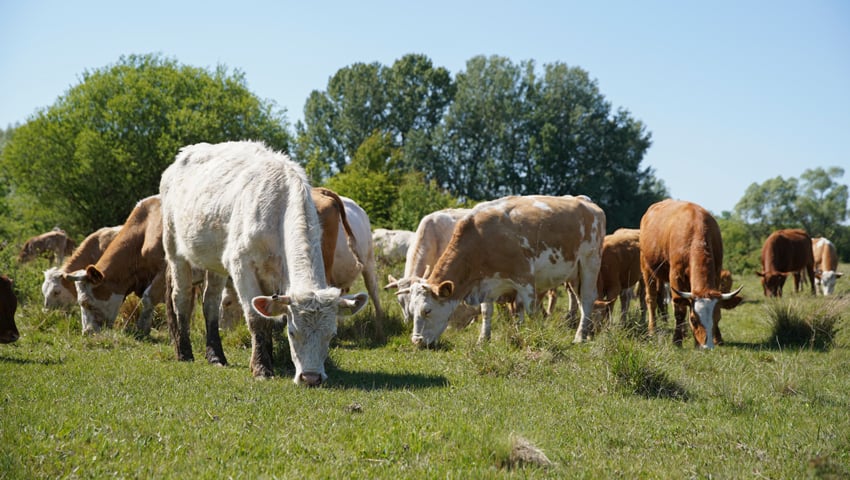Article by Rhian Price
How can farmers adapt to meet the climate change challenges? This was the question posed by the British Cattle Breeders Club at its conference in Telford, Shropshire, last week.
Acclaimed academics, scientists and leading farmers told delegates how a combination of tools could help farmers deliver Net Zero.
These included adopting carbon calculators, breeding more efficient animals, greater supply chain collaboration and moving to regenerative agriculture.
A journey to Net Zero
Professor John Gilliland, from Queens University Belfast and AHDB adviser, presented findings from the ARC Zero project, which involved seven farms in Northern Ireland.
As part of the project, which was funded by the NI Executive and the EU’s EIP-Agri Programme, farms measured GHG emissions and carbon sequestration. This empowered behavioural change and three farms have reached net zero since 2021. The project revealed that 97% of carbon was stored in the soil, not in trees.
Prof Gilliland said, “As we race to get rid of animals and plant trees, remember one thing: it is the soil we need to look after.”
Regenerative farming
ffinlo Costain, Chief Editor of 8point9.com and former chief executive of the think tank Farmwel, spoke about how regenerative farming was fundamental to delivering ecological security and turning the tide on the climate crisis.
“‘Ecological breakdown’ is already affecting the food production that depends on it.
“Just as nations are turning to renewables for greater energy security – we must turn to regenerative farming for ecological security.”
Organic dairy farmer, Wil Armitage from Leicestershire, said soil health was a key part of a healthy business alongside healthy cows, people and profit.
He said, “Dead soils produce empty calories with very little mineral content which challenges our stocks’ immune systems.”
He revealed the steps they were taking to maintain good soil health, including growing a diversity of crops and avoiding bare soils.
‘Profitability underpins sustainability’
A clear message at this year’s conference was how profitability underpinned sustainability – “you can’t go green if you are in the red”, was how one audience member phrased it.
Aberdeenshire suckler farmer Duncan Morrison explained how running a simple, low-cost grass-based system had helped him build a “lean and mean” business.
He advocated investing in “flesh, not metal” and performance recording animals under pressure.
Delegates also heard how greater collaboration in the supply chain could help improve efficiencies.
Dairy-beef finishers, Brongain Farm, Llanfechain, are using rapid colostrum tests and paying suppliers a 10-15% uplift for calves that achieve target to ensure good health and future performance.
The role of genetics
Mark Smith, EMEA Beef Director at Genus ABS, said: “Sustainability starts with genetics. It’s permanent and cumulative – it carries on generation after generation.”
He said the difference between Genus’ best and baseline dairy-beef sires equated to £180, and the most profitable ones also emitted 17% less Greenhouse Gas (GHG) emissions.
Dairy farmer Rory Christie, from Dourie Farming Co in South-West Scotland, revealed how he and three other farmers, led by geneticist Mike Coffey from SRUC, have helped create the first crossbreeding genomic index as part of the Fast Breeders Project.
Milk fat, protein, and SCC have improved with yields up by 500 litres per cow per year while concentrate use has been lowered at Mr Christie’s farm.
BCBC Chairman, Ben Harman, said, “In the face of perceived challenges ahead, there was an overwhelming positivity from speakers and delegate alike.
“While it was clear that there is no silver bullet, the use of accurate data in our management and breeding decisions will help us improve our environmental and economic sustainability.”
